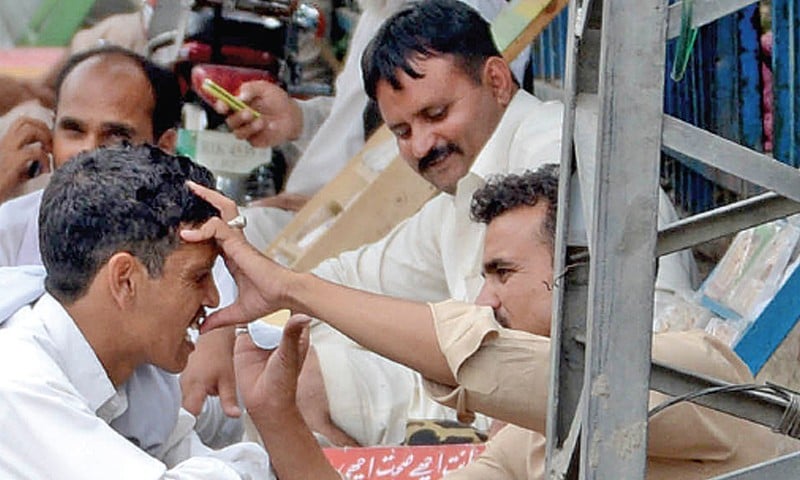
The Punjab Healthcare Commission is actively pursuing drive against fake medical practitioners

A depressing news appeared in almost all newspapers, a few weeks ago, informing that a newborn died and his mother was in serious condition during a surgery, carried out by a quack doctor in Farooqabad, Sheikhupura. The quack has been arrested and the clinic sealed on the order of DCO Sheikhupura. This has not happened for the first time. We have been reading about such tragedies where quacks have been playing with the health and life of people.
According to an estimate, about 270,000 quacks are practicing unlawfully and providing healthcare services to patients/consumers who are enticed by the low cost of services offered by quacks. Such patients expose themselves to various health hazards often resulting in dire consequences. Unsafe injections and unsterilised instruments for dental treatment contribute to the spreading of lethal infections like HIV Aids, Hepatitis and other serious infections. In general term, "quackery" is defined as the promotion of unproven or fraudulent medical practice. This definition could also cover the quackery amongst professional medical practitioners who practice medicines or surgery beyond their formal qualifications and skills that they actually have.
In Pakistan, quackery is considered a norm on one side and a health-hazard on the other. It is a means to mint money from innocent patients. The health and life of a patient seeking treatment from a person who lacks professional knowledge and skills is in danger.
In Punjab, culturally people believe in traditional methods of healing with home-made remedies and/or seek help from those who perform healing procedures or prescribe remedies for illness even without formal education and license. Usually, these healers are called Jirah, Pahalwan/chiro-practitioner, and Pansari. Traditionally, people tend to accept such treatment as cost effective and non-risky, thus they do not call such practitioners as quacks.
Addressing all these healthcare service delivery issues, the Punjab Healthcare Commission (PHC), an autonomous health regulatory body, has been established under the PHC Act 2010. The PHC aims to improve the quality, safety and efficiency of healthcare service delivery for all public and private Healthcare Establishments (HCEs) including Allopaths, Homeopaths and Tibb in the province of Punjab.
According to an estimate, about 270,000 quacks are practicing unlawfully and providing healthcare services to patients/consumers who are enticed by the low cost of services offered by quacks.
The Punjab Healthcare Commission is pursuing the enforcement of the ban on quackery mainly in two ways; first through exclusion of quacks by registration and licensing of qualified professionals; and second through a responsive and evenhanded Complaints Management System that ensures that the unqualified/unregistered practitioners and unlawful establishments are brought to book. The Punjab Healthcare Commission has launched an anti-quackery campaign whereby quacks imperiling the health and safety of vulnerable people will be systematically identified and apprehended.
The commission has issued 5696 provisional license to healthcare establishments in Punjab whereas over 21000 health service providing centres have been registered. Punjab Healthcare Commission under its anti-quackery campaign has sealed 2700 quack clinics and efforts are being made successfully to continue this operation throughout the province.
At present, majority of patients are still visiting ‘Allied Healthcare Workers’ who are not qualified or registered as medical practitioners and are much easy to be accessed, as one such practitioner is available for 350 persons as opposed to one qualified doctor available for 1,290 persons. However, it is not evenly distributed. It is also realised that still there shall be pockets of population (patients) whose healthcare needs will remain unmet due to non-availability of qualified professionals.
Another vibrant initiative taken by the commission is holding census of all kinds of health service delivery establishments and private clinics in Punjab. This step is being taken for the first time in the country to have an authentic and reliable data. This will be a landmark to ensure delivery of standardised healthcare services, identify maladministration and malpractice in health facilities. Five divisions of the Punjab have been marked for this purpose to start with including Lahore, Faisalabad, Multan, Rawalpindi and Sahiwal.
The PHC has developed a multi-pronged anti-quackery strategy covering registration and licensing of all healthcare establishments through enforcement and monitoring of ‘Minimum Service Delivery Standards’ to exclude the unqualified and unregistered practitioners; persuade the Health Department to enforce the available laws/rules to check quackery; set up an anti-quackery cell for coordination of implementation and enforcement of anti-quackery activities; develop a data base of healthcare providers at the provincial and district level and organise public awareness campaigns to promote patient rights and safety and the importance of the quality healthcare.
The Punjab Healthcare Commission, in the first quarter of current year 2015, has sealed over 900 quack clinics against which around 300 requests for de-sealing have been received till July 2015. A special Anti-Quackery Hearing Committee, headed by a senior healthcare professional and having legal and pharmacy qualified members, conduct hearing of de-sealing requests. Many a quacks have shut down their illicit setups while other have made their ways by providing services under the supervision of qualified specialists.